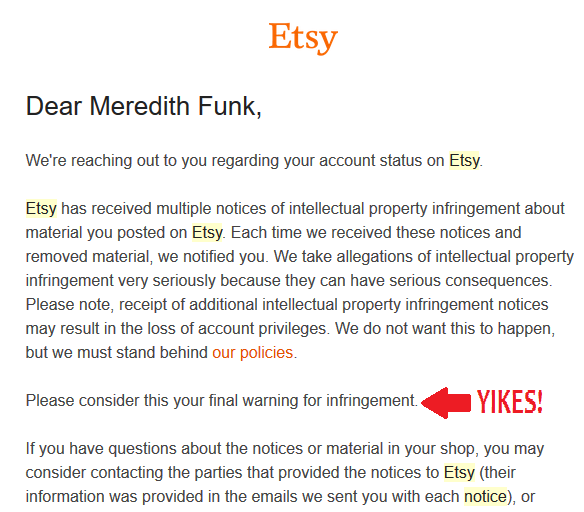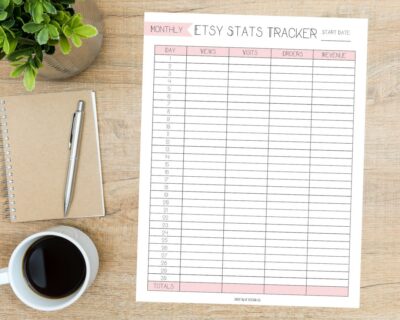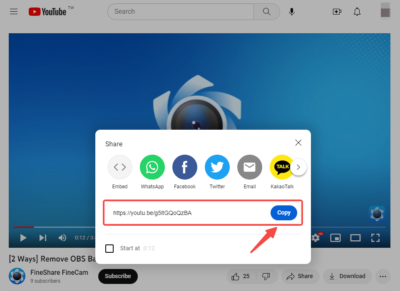Copyright is a fundamental concept that plays a pivotal role in protecting creative works from unauthorized use. It grants creators exclusive rights to their original works, preventing others from reproducing, distributing, or displaying those works without permission. In the context of Etsy, where artistic expression thrives, understanding copyright basics is crucial for both buyers and sellers.
What Does Copyright Cover?
Copyright applies to a wide range of creative works, including but not limited to art, music, literature, and photographs. On Etsy, this can encompass handmade crafts, digital art, and unique designs. Sellers should be aware that copyright protection is automatic upon the creation of an original work, and no formal registration is required.
Rights of Copyright Holders:
- Reproduction: The right to make copies of the work.
- Distribution: The right to distribute copies to the public.
- Public Display: The right to showcase the work publicly.
- Derivative Works: The right to create adaptations or derivative works.
Duration of Copyright:
It's essential for Etsy sellers to be aware of the duration of copyright protection. In many jurisdictions, copyright protection lasts for the creator's lifetime plus a certain number of years. Understanding the duration helps creators and buyers know when a work enters the public domain and can be freely used by the public.
Fair Use and Copyright Exceptions:
Etsy sellers should also grasp the concept of fair use and other copyright exceptions. Fair use allows the limited use of copyrighted material for purposes such as criticism, commentary, news reporting, teaching, and research without the need for permission. However, the interpretation of fair use can be nuanced and may vary.
Responsibilities of Etsy Sellers:
As an Etsy seller, it's crucial to respect the copyright rights of others. Avoid using copyrighted material without proper authorization, and be cautious about creating works that closely resemble existing copyrighted works. This not only ensures legal compliance but also fosters a community of respect among Etsy creators.
By gaining a solid understanding of these copyright basics, Etsy sellers can navigate the platform with confidence, fostering a culture of creativity while respecting the intellectual property of fellow artisans.
Etsy Copyright Policies
Etsy, as a platform that thrives on creativity, has established clear copyright policies to ensure a fair and respectful environment for both sellers and buyers. It's imperative for users to acquaint themselves with these policies to avoid potential legal issues and maintain the integrity of the Etsy community.
Etsy's Copyright Policy Overview:
Etsy prohibits the use of its platform to infringe on the intellectual property rights of others. This includes copyright infringement. Sellers on Etsy are expected to respect the copyrights of others and ensure that their listings and products comply with Etsy's policies.
Prohibited Items:
Etsy explicitly outlines the types of items that are not allowed on the platform due to copyright concerns. This may include replicas, counterfeit items, and works that infringe on the copyrights of others. Sellers should carefully review Etsy's list of prohibited items to ensure their offerings align with the platform's guidelines.
Reporting Copyright Infringement:
Etsy provides a mechanism for reporting copyright infringement. If a user believes that their copyrighted work is being used without permission on the platform, they can submit a notice to Etsy. The platform takes these reports seriously and may take appropriate action, including removing the infringing material and, in severe cases, suspending or terminating the account of the infringing party.
Protecting Your Own Copyright:
Etsy encourages sellers to take proactive steps to protect their own copyrights. This includes clearly communicating ownership of intellectual property in product listings and reporting any instances of infringement promptly. Sellers should also consider using watermarks or other protective measures for their digital works.
Consequences of Copyright Violations:
Etsy emphasizes that repeated violations of its copyright policies may result in serious consequences, including the suspension or termination of a seller's account. This underscores the platform's commitment to maintaining a marketplace where intellectual property rights are respected, fostering a positive and legal environment for creators and consumers alike.
By familiarizing themselves with Etsy's copyright policies, sellers can navigate the platform confidently, knowing that their creative works are protected, and they are contributing to a community that values originality and respects intellectual property rights.
Also Read This: Transform Words into Pictures with AI: A Step-by-step Guide
Common Copyright Pitfalls on Etsy
Etsy's bustling marketplace is a haven for creativity, but it's essential for sellers to be aware of common copyright pitfalls that can inadvertently lead to legal issues. Understanding these pitfalls and taking proactive measures is crucial for maintaining a thriving and compliant Etsy store.
1. Unauthorized Use of Copyrighted Material:
One of the most common pitfalls is using copyrighted material without proper authorization. Sellers should refrain from using images, designs, or content that they do not own or have the right to use. This includes graphics, logos, and even product descriptions that may be protected by copyright.
2. Neglecting Licensing Agreements:
Sellers who source materials or collaborate with other creators should pay close attention to licensing agreements. Neglecting to adhere to the terms of a license, whether it's for graphics, fonts, or other assets, can result in copyright violations and potential legal consequences.
3. Creating Derivative Works Without Permission:
While Etsy celebrates creativity, sellers must be cautious when creating derivative works based on existing copyrighted material. Without proper permission or licensing, crafting products or designs inspired by copyrighted works can lead to legal challenges.
4. Ignoring Public Domain Guidelines:
Sellers should be mindful of the public domain status of certain works. Assuming a work is in the public domain without proper verification can result in unintentional copyright infringement. It's crucial to understand the duration of copyright protection and when works enter the public domain.
5. Overlooking Trademark Issues:
Copyright isn't the only intellectual property consideration on Etsy; trademark issues also deserve attention. Sellers should avoid using trademarks, brand names, or logos without permission, as this can lead to trademark infringement claims.
Proactive Measures to Avoid Pitfalls:
- Thorough Research: Conduct thorough research to ensure that all materials used are either original or used within the bounds of copyright laws.
- Obtain Proper Licensing: When using third-party assets, obtain proper licensing and adhere to any restrictions outlined in the license agreement.
- Understand Public Domain: Familiarize yourself with the public domain guidelines and ensure that the works you use are not still under copyright protection.
- Respect Trademarks: Avoid using trademarks without proper authorization, respecting the intellectual property rights of brands.
Awareness of these common copyright pitfalls, coupled with proactive measures, will empower Etsy sellers to navigate the platform confidently, fostering a community that respects intellectual property and supports the diversity of creative expression.
Also Read This: How to Increase Visibility on Shutterstock: A Comprehensive Guide
Protecting Your Creative Works
Ensuring the protection of your creative works on Etsy is paramount for maintaining the integrity of your brand and avoiding potential legal issues. Here are essential strategies to safeguard your intellectual property and foster a secure and respectful online presence.
1. Clearly Communicate Copyright Ownership:
When listing your products on Etsy, clearly communicate your ownership of the copyright for each item. Use descriptive language in your product descriptions, asserting your rights and specifying the permitted uses of your creations. This helps set expectations for buyers and reinforces your commitment to protecting your work.
2. Watermark Your Digital Works:
For digital works such as images or downloadable content, consider watermarking your creations. Watermarks act as a visible deterrent to potential infringers and serve as a clear indicator of the work's origin. While not foolproof, watermarks can discourage unauthorized use and make it easier to identify instances of infringement.
3. Utilize Intellectual Property Notices:
Include copyright symbols (©), trademark symbols (™), or registered trademark symbols (®) where applicable. This small but significant addition to your product listings serves as a visual cue to potential infringers that your work is protected. It also reinforces your commitment to respecting intellectual property rights.
4. Monitor and Respond to Infringement Promptly:
Regularly monitor your Etsy store and other online platforms for potential copyright infringement. If you identify unauthorized use of your creative works, act promptly. Etsy provides mechanisms for reporting copyright infringement, allowing you to submit notices and take steps to protect your intellectual property.
5. Register Your Copyright:
While copyright protection is automatic upon creation, formally registering your copyright with relevant authorities provides additional legal benefits. In some jurisdictions, registering your copyright makes it easier to pursue legal action and may result in higher damages if infringement occurs.
Educate Your Customers:
- Terms of Use: Clearly outline the terms of use for your creative works, specifying how buyers can use your products and any restrictions that apply.
- FAQ Section: Include an FAQ section in your Etsy store, addressing common questions about copyright, licensing, and the proper use of your creations.
Conclusion:
Protecting your creative works on Etsy requires a proactive approach that combines legal awareness, technological measures, and clear communication. By implementing these strategies, you not only safeguard your intellectual property but also contribute to a marketplace where respect for creativity is paramount.
Also Read This: Insights into Popular and Profitable Content: Adobe Stock’s Best Selling Images
FAQ
Here are answers to frequently asked questions about copyright issues on Etsy, providing clarity and guidance for both new and experienced sellers:
Q1: What steps can I take to protect my creative works on Etsy?
A1: To protect your creative works, clearly communicate copyright ownership in your product descriptions, use watermarks for digital works, employ intellectual property notices, monitor for infringement, and consider registering your copyright for added legal protection.
Q2: Can I use copyrighted material if I give credit to the original creator?
A2: Giving credit does not automatically grant the right to use copyrighted material. Permission or proper licensing is essential. Always respect the intellectual property rights of others and obtain permission before using copyrighted works.
Q3: What are the consequences of copyright infringement on Etsy?
A3: Etsy takes copyright infringement seriously. Consequences may include the removal of infringing material, suspension, or termination of the seller's account. Repeat violations can lead to more severe penalties.
Q4: Do I need to register my copyright to have protection on Etsy?
A4: No, copyright protection is automatic upon the creation of an original work. However, registering your copyright can provide additional legal benefits, making it easier to pursue legal action and potentially increasing damages in case of infringement.
Q5: How can I report copyright infringement on Etsy?
A5: If you believe your copyright is being infringed on Etsy, you can submit a notice to Etsy through their reporting system. Etsy will review the report and take appropriate action to address the infringement.
Q6: Are there specific rules for using public domain works on Etsy?
A6: While public domain works can be freely used, it's important to verify their public domain status. Indicate in your listings if a work is in the public domain, and be cautious about any additional elements that may still be under copyright.
Q7: Can I sell fan art or products inspired by copyrighted works on Etsy?
A7: Selling fan art or products inspired by copyrighted works may infringe on the original creator's rights. It's advisable to seek permission or determine if your use falls under fair use. Be cautious and respectful of existing copyrights.
These frequently asked questions provide essential insights into navigating copyright issues on Etsy. Sellers are encouraged to stay informed, respect intellectual property rights, and seek legal advice if needed to ensure a compliant and creative presence on the platform.
Also Read This: Download Dexterity: How Can You Download Your Entire Photobucket
Case Studies
Examining real-life examples of copyright infringement on Etsy sheds light on the challenges sellers may face and the importance of proactive copyright protection. Let's delve into a few case studies that illustrate different scenarios and outcomes:
| Case | Description | Outcome |
|---|---|---|
| Case 1 | A seller unknowingly used a popular character in their products without obtaining proper licensing. | The copyright holder issued a takedown notice, and the seller's listings were removed. The seller had to cease using the infringing material. |
| Case 2 | A seller created fan art and listed it on Etsy, assuming it fell under fair use. | The copyright holder argued that the use exceeded fair use and requested the removal of the listings. The seller complied to avoid legal action. |
| Case 3 | A seller unintentionally used a copyrighted image in their product photos. | The original copyright holder discovered the infringement and contacted the seller. The seller replaced the images with original content and issued an apology. |
Key Takeaways from Case Studies:
- Know What You Use: Conduct thorough research to ensure the materials you use are either original or used within the bounds of copyright laws.
- Understand Fair Use: Be cautious when relying on fair use, as its interpretation can be subjective and may lead to legal challenges.
- Regularly Monitor Listings: Keep a close eye on your listings and promptly address any concerns or reports of potential copyright infringement.
- Seek Permission: When in doubt, seek permission from copyright holders before using their intellectual property in your creations.
These case studies highlight the need for Etsy sellers to be vigilant and proactive in respecting copyright laws. By learning from these real-life examples, sellers can make informed decisions, protect their creative works, and contribute to a community that values and respects intellectual property.
Also Read This: Discover How to Save Videos from Pinterest on iPhone With This Simple Trick
Legal Recourse for Copyright Violations
Understanding the legal recourse available for copyright violations is crucial for Etsy sellers seeking to protect their creative works. While Etsy provides a platform-specific reporting system, there are broader legal avenues that creators can explore when copyright infringement occurs.
1. Cease and Desist Letter:
If you discover that someone is infringing on your copyright, a cease and desist letter can be an initial step. This formal communication requests the infringing party to stop using your copyrighted material. While not a legal document, it may resolve the issue amicably without the need for litigation.
2. Digital Millennium Copyright Act (DMCA) Takedown:
The DMCA provides a mechanism for copyright holders to request the removal of infringing material from online platforms, including Etsy. Etsy complies with DMCA takedown notices, promptly removing the infringing content upon receipt of a valid notice from the copyright holder.
3. Legal Action:
If the infringement persists and informal methods prove ineffective, taking legal action may be necessary. Consult with an intellectual property attorney to discuss the feasibility of pursuing a lawsuit for copyright infringement. Legal action can result in damages, injunctions, and other remedies to stop the unauthorized use of your creative works.
4. Etsy's Intellectual Property Policy:
Etsy has established an Intellectual Property Policy that outlines procedures for reporting intellectual property infringement on the platform. Sellers can use Etsy's reporting system to submit notices, prompting Etsy to take action against infringing parties. This policy reinforces Etsy's commitment to maintaining a marketplace that respects intellectual property rights.
5. Copyright Registration:
While not a prerequisite for legal action, registering your copyright with relevant authorities strengthens your position in legal proceedings. Registered copyrights may entitle you to statutory damages and attorney's fees in addition to actual damages.
Consulting with Legal Professionals:
For personalized guidance and advice tailored to your specific situation, consulting with intellectual property attorneys is advisable. They can assess the details of the infringement, provide legal counsel, and help determine the most effective course of action to protect your rights as a creator.
Understanding the legal recourse options empowers Etsy sellers to take decisive action when faced with copyright violations, ensuring the protection of their creative works and contributing to a marketplace that upholds the principles of intellectual property rights.
Conclusion
As we conclude our exploration of copyright caution on Etsy, it becomes evident that maintaining a creative and respectful presence on the platform requires a nuanced understanding of intellectual property laws. Etsy, as a vibrant marketplace for artists and creators, encourages a culture of originality and respect for copyright.
Key Takeaways:
- Understanding copyright basics is fundamental for both buyers and sellers on Etsy.
- Adhering to Etsy's copyright policies is essential to ensure a compliant and thriving store.
- Awareness of common copyright pitfalls empowers sellers to navigate potential challenges.
- Proactively protecting creative works involves strategic measures such as clear communication, watermarking, and utilizing intellectual property notices.
- Case studies underscore the importance of vigilance and respect for copyright to avoid legal consequences.
- Legal recourse options, including DMCA takedowns and legal action, provide avenues for addressing copyright violations.
In a world where digital creativity flourishes, Etsy serves as a canvas for artists to showcase their unique talents. By embracing copyright caution, sellers contribute to a marketplace that values originality, respects intellectual property, and fosters a community of creativity.
As you continue your journey on Etsy, remember that each creation is a testament to your talent and passion. By staying informed, respecting the rights of fellow creators, and taking proactive measures to protect your work, you not only safeguard your own intellectual property but also contribute to the vibrant and diverse tapestry of the Etsy community.














